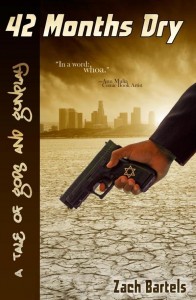Harry Potter, Bob The Tomato, and Genre
 A month ago, I was deep in the woods of Michigan’s beautiful Upper Peninsula, serving my yearly stint as “camp pastor” for a group of 7th and 8th grade church kids. We (the campers, staff, counselors, and myself) had the precious opportunity to get away from it all for seven days, to a place where your cell phone can’t get a signal, but your sense of wonder at God’s eternal power and divine nature is at four bars. Look around and you’ll see evergreens, birch trees, a crystal clean lake, and a dozen quaint little cabins, each with a sentimental name like “Sunset Bay.”
A month ago, I was deep in the woods of Michigan’s beautiful Upper Peninsula, serving my yearly stint as “camp pastor” for a group of 7th and 8th grade church kids. We (the campers, staff, counselors, and myself) had the precious opportunity to get away from it all for seven days, to a place where your cell phone can’t get a signal, but your sense of wonder at God’s eternal power and divine nature is at four bars. Look around and you’ll see evergreens, birch trees, a crystal clean lake, and a dozen quaint little cabins, each with a sentimental name like “Sunset Bay.”
And yet all the kids were talking about Harry Potter.
Okay, maybe not all of them, but it was surely a recurring theme. The final movie in the series had been released the Friday previous and a good number of the campers had seen it. Many more had plans to attend a screening upon returning home. Whether in casual conversation or in the group discussions that followed my twice-daily teaching sessions, Harry Potter was trending among Baptist youth that week. This was disconcerting to at least one adult leader, who thought that such wicked stories should not be mixed in with discussion of the Holy Scriptures—not in any way.
I shall leave that particular dead horse what little dignity he has left by not beating him further, particularly since I have not read or seen any of the books/movies in the franchise.1 And yet, in light of this phenomenon, I couldn’t help but think back to my days as a youth pastor, and a small controversy that I’ve come to refer to as Larrygate.
Larrygate centered around the selection of Vacation Bible School curriculum at a small Baptist church in 1997. No one had heard of Harry Potter back then, but there was all kinds of buzz around VeggieTales. And VeggieTales had a brand new VBS-in-a-box within our price range, which promised to draw in the kids with its it factor and build word-of-mouth among our target demo in the neighborhood. But then our old-school Christian ed director, Vera (not quite her real name), spoke up.
“I won’t have this at my church,” she said firmly. “It’s fantasy.”
Vera was concerned that mixing the proclamation of Truth (i.e. Christ’s death and resurrection for the salvation of sinners) with far-fetched make-believe (i.e. talking/singing vegetables with a penchant for ’80s pop culture and inside jokes) would confuse the children. Her argument was a modification of the old Fundamentalist Santa Claus refutation: how can we expect the kids to go on believing in God when they realize they’ve been, in some sense, duped?
Long story short: Bob and Larry were not invited to VBS at our church that year. Not yet being a parent and not being in a position of overseeing children’s ministries at the time, I really had no dog in the fight, and thus watched it all go down with a detached amusement. I found the absurdity of Vera’s argument entertaining, if not compelling. Did she really lack any concept of genre? She always seemed to me a rather bright and capable woman, and yet this was the hill on which she chose to die. Weird.
Things would get weirder. At the same church, a few months later, I found myself in a conversation with another church leader who insisted that the stories conveyed in the parables of Our Lord really happened. That’s right, these tales (in addition to conveying spiritual meaning) were historically accurate narratives, describing actual events. If not, this man asserted, then Jesus was being dishonest and deceptive in telling them. I tried to explain the ins and outs of the parable genre, a form that was well-known to Jesus’ original audience, but my friend would have none of it. Either Jesus is a liar (and therefore not truly who he claimed to be) or the Good Samaritan, the rich fool, the wicked husbandman, and the ten virgins were as much real historical figures as Christ himself.
Of course it occurred to me that his logic was swinging to the same absurd extreme as Vera’s had the summer before. And yet, neither of them were unintelligent people. Were I to begin a sermon with the words, “Once upon a time,” they would recognize immediately that I was making use of the fairy tale form as a sermon illustration, in order to help convey spiritual Truth. I doubt either of them would accuse me of deceiving or confusing anyone. Their world has always made room for this genre, and so they find no stumbling block when it is employed. Just like Jesus’ original audience knew at once that his parables were inventive stories meant to illustrate a spiritual principle (many of them already-famous parables given new twists by Jesus). And just like kids know instinctively that cartoon characters aren’t real, even while they might communicate very real (and important) concepts, like fire prevention or, say, the importance of telling the truth.
 If the genre is comfortable, it gets a pass. I think we all find allegory rather nonthreatening—hence the lack of furor surrounding Bunyan’s Pilgrim’s Progress, a gripping tale of an exciting journey which did not (and could not) happen literally, as such. And yet, Bunyan is rarely called out for confusing or deceiving the masses. Because allegory is nice and neat. Maybe that’s why we try and allegorize the parables, even when it tends to confuse them. (Try making sense of Augustine’s explanation of the Good Samaritan.) It may also explain why Lewis’s Narnia books (despite Lewis’s insistence that they are not allegories) are so widely accepted, even in circles where the Harry Potter books are fit to be burned for their depictions of magic (and Lewis’s other fictional works—for example, his Space Trilogy—are never discussed). And yet, as it has been pointed out so frequently of late, the magic of Narnia was depicted as having effects in our world.
If the genre is comfortable, it gets a pass. I think we all find allegory rather nonthreatening—hence the lack of furor surrounding Bunyan’s Pilgrim’s Progress, a gripping tale of an exciting journey which did not (and could not) happen literally, as such. And yet, Bunyan is rarely called out for confusing or deceiving the masses. Because allegory is nice and neat. Maybe that’s why we try and allegorize the parables, even when it tends to confuse them. (Try making sense of Augustine’s explanation of the Good Samaritan.) It may also explain why Lewis’s Narnia books (despite Lewis’s insistence that they are not allegories) are so widely accepted, even in circles where the Harry Potter books are fit to be burned for their depictions of magic (and Lewis’s other fictional works—for example, his Space Trilogy—are never discussed). And yet, as it has been pointed out so frequently of late, the magic of Narnia was depicted as having effects in our world.
Maybe that’s where the trouble begins: when the genre becomes, in any way, complex—when a story takes place in our world, and yet the only way we can find “biblical value” is to try and allegorize it. This has raised some eyebrows even in the world of “Christian Fiction.” The Oath by Frank Peretti (which I rather like, despite some pretty rough reviews) is perhaps the purest example. If the dragon creature, being sin itself, is a metaphor, then why are people putting their faith in Jesus within the framework of the story and finding salvation from non-metaphorical sin? Is it an allegory or not? If not, where do we file it? If a story is too complex to be categorized in a black-and-white Realistic Narrative / Allegorical Illustration dichotomy, can anything good come out of it? (Spoiler alert: Vera says no.)
Much of Stephen Lawhead’s work is similarly slippery and difficult to categorize, a problem which has reportedly vexed Zondervan to no end. In the end, even his Celtic Crusades series bears the word “Fantasy” on the spine, despite containing no elements that a Bible-believing reader would find outside of the realm of possibility.2 What makes it fantasy, then? That it didn’t really happen?
 In that sense, I suppose all fiction is speculative, as it initially takes place in the author’s fantasy and involves the creation of worlds populated with people who do not exist. My latest book, 42 Months Dry: A Tale of Gods and Gunplay is a loose retelling of the story of Elijah the prophet, with a different genre (urban noir), setting, time period (present day-ish), etc. While Elijah was a real, historical figure who really did miracles and served God as a prophet (primarily during the reign of King Ahab), these events did not happen “that way,” and so I can only guess that there is a school of thought that would call me dishonest and even deceptive. And yet, my intended audience is as familiar with the conventions involved as a First Century Jew would be familiar with the parable. And, at any rate, everything from the cover design to the marketing copy to the Library of Congress category tells the reader what to expect.
In that sense, I suppose all fiction is speculative, as it initially takes place in the author’s fantasy and involves the creation of worlds populated with people who do not exist. My latest book, 42 Months Dry: A Tale of Gods and Gunplay is a loose retelling of the story of Elijah the prophet, with a different genre (urban noir), setting, time period (present day-ish), etc. While Elijah was a real, historical figure who really did miracles and served God as a prophet (primarily during the reign of King Ahab), these events did not happen “that way,” and so I can only guess that there is a school of thought that would call me dishonest and even deceptive. And yet, my intended audience is as familiar with the conventions involved as a First Century Jew would be familiar with the parable. And, at any rate, everything from the cover design to the marketing copy to the Library of Congress category tells the reader what to expect.
Our God is clearly not against using a given genre (according to its own rules) to convey Truth. In addition to parable, we see lament, epistle, psalm, proverb, royal genealogy, and apocalyptic literature within the canon, to name just a few. God isn’t using borrowed capital in these cases. These things are already God’s and, in turn, he found each to be the best genre through which to inspire his eternal and perfect Word so that finite and flawed humans could grasp it.
Today, of course, the canon is closed. But we are still made in God’s image, and we continue to find and convey Truth through any number of genres, including many that did not exist when the Bible was being assembled. The question at the core of both Larrygate and Harrygate is this: which post-biblical genres should be considered entirely off limits and unable to convey Truth, either directly or indirectly? Action/suspense? Fantasy? Sci-fi? Snark-laden comedy? Anime? CGI slapstick? Graphic novel?
Let me return to the subject of VeggieTales, as it provides a simple case study. Now, I’m of the opinion that a heaping helping of Dare-to-be-a-Daniel-style Law (even with a God-made-you-special-and-loves-you-very-much dessert) is not the best way to communicate the Truth of the Scriptures to our children, and certainly no replacement for the Gospel. But my critique does not extend to the medium or the genre. VeggieTales creators Phil Vischer and Mike Nawrocki were pioneers in their field (a relatively rare thing in Christian circles these days), and are masters of what they do. Whether or not it’s the right message, the message is not lost in the “fantasy” as Vera feared. Because five-year-olds know that vegetables aren’t sentient; they just like the jokes, the characters, and the neat, gift-wrapped morals. My 13-year-old campers were well-aware that wizards aren’t real, but the Harry Potter epic gives them a test canvas on which to work out some of the biblical metanarrative against an alternate real world. And, deep down, we all know that we’re drawn to the world of good and evil, angels and demons, four-headed creatures, celestial cities, dragons, prophets, priests, miracles, magic, and wonder because of something that God placed within us—something that knows for a fact that there’s a world beyond our wildest dreams awaiting us on the other side of the veil.
It would be dishonest not to explore it.
Footnotes
- I mean no disrespect here to those who have been so passionately discussing the topic, only that I have nothing to add. In fact, if you will indulge me the McGuffin of the new Harry Potter movie, I shall focus on fiction that presents itself as Christian, avoiding the question of whether “secular” speculative fiction can be edifying as well … although I will tip my hand by saying that I believe any three stories in Machine of Death contain more spiritual insight than your average three Christian novels.
- With the exception of portraying Pelagius as a misunderstood orthodox theologian, persecuted for purely political reasons.
Zach Bartels is a pastor, an author, and an award-winning Bible teacher. He currently serves a church in Lansing, Michigan, where he lives with his wife Erin and their son. He holds degrees from Cornerstone University and Grand Rapids Theological Seminary.
Zach enjoys film, fine cigars, gourmet coffee, reading, writing, and chopping down altars to Baal. His books include 42 Months Dry and two satires (written with Ted Kluck), Younger, Restlessler, Reformeder and Kinda Christianity, which peaked at #2 in the Religious Humor category on Amazon. He is presently writing a thriller, involving demon possession, undercover Jesuit agents, a hard-nosed detective, and a televangelist with really white teeth.
You can find more information and follow Zach’s blog at www.pastorzach.com.











































Thanks for this, Zach. I have always wondered if I was the only one who felt this way. (This is kind of an aside, but my amazing mother has always struggled with showing her grandkids and Sunday school class VeggieTales clips because she wondered if they would only be able to picture Jesus as a carrot or some other veggie for the rest of their life. Ha.)
Anyway, God has given us incredible, vivid imaginations…. and, for goodness sakes, a SENSE OF HUMOR… and I like to think it’s for what you pointed out in that last paragraph. There is so much more to come, beyond our wildest dreams.
Ha ha, I didn’t realize that people hated Veggietales when it came out. That’s funny.
I’ve known two Christians who prided themselves on reading nothing but the Bible. I then had one of them try to tell me that the evil forces in the Narnia movies was the same as the Force in Star Wars, leaving me bemused and confused. (I haven’t seen the Dawn Treader movie so I couldn’t properly refute her.)
And you know, there’s the flipside to Christians taking everything literally. I’ve known lots of non-Christians who can’t understand that the Bible has metaphor in it, like in the Psalms. And therefore the Bible has contradictions and says all this nonsense! Therefore it can’t be true!
I’ve had this same argument about metaphor and story before. It’s when you run into people who are so close-minded they refuse to have their ideas challenged, so they come up with really wacko arguments to defend themselves.
For the best refutation, I would suggest ignoring the Dawn Treader movie entirely, because it was sadly woebegone, especially as an adaptation of the book, but even on its own movie merits. Lewis, in the book, captured both the thrill of exploration into the unknown and especially the worth of giving up everything to find Aslan’s Country — themes movie threw overboard in favor of emphasis on finding good within yourself (Pelagianism) and battling evil things that of course are only outside yourself. All that was far worse than any “magic” in the imaginary world of Narnia.
But slowly I’ve come to conclude that Christians who pass along poorly thought-out discernment like that are at best being hideously careless with the truth. At worst, they are committing slander. Informed of this with love and care, they should either stop addressing the issue at all, or do their research and change their minds. But if the person does not, and persists in the slander, it becomes an actual sin issue.
All that comes down to the need to both show and tell how we read Scripture using right hermeneutics. If one reads a Biblical metaphor, poem, parable, etc., literally (as in wooden “it must have happened for real” “literalism”), that is in fact a “nonliteral” reading, if one defines the term “literal” in the way such a reader defines it. In actuality, reading Scripture literally — as in, in context, paying attention to the genre and how original readers understood it — requires discerning between metaphor and narrative description, epistle doctrine exegesis and poetry.
Of course, this has tremendous applications to discerning fiction as well …
I’ve begun wondering whether comparing how Christians read the Bible and other books to how some politicians misread the Constitution might be a good strategy. It could work, mainly because more Christians seem to understand that the Constitution should be read and interpreted with an eye toward its original intent, while it’s perfectly fine to treat Scripture itself, or other fiction, as a “living document” whose meaning is subjective to how I want to understand and apply it. …
Great point, Kessie.
Becky
I started out very leery of Harry Potter because of the witchcraft angle, but my son has a wise godmother who insisted that the books were great for widening a child’s reading horizons and that I had to read at least one before I rejected them all. So I did. I realized she was right. Since she is also a very godly woman, I told myself firmly that any false churchianity guilt I had about allowing these books into our home had nothing to do with Christ, and I moved on.
We stopped watching the movies as a family because they kept getting darker and scarier, and we’re just not comfortable with horror.
I am never sorry to have watched a VeggieTales movie. Just because they’re teaching, as you put it, “Old Testament morals” doesn’t make the lessons any less applicable to today, although we serve God out of love and gratitude for the gift of new life He has given to us, and not because we are trying to cover over our sins with the blood of animal sacrifice.
I think too many Christians now want to focus on God’s grace and forgiveness, and forget that part of being saved is being sanctified, and you simply don’t progress with your sanctification if you aren’t seeking to please your Lord. How do we please God? Well, we’ve got all of this great material in the Old Testament where He’s made it clear what kinds of activities and actions please Him! It’s a shame to dismiss it as “Old Testament morals,” that therefore does not apply to me today!
The best and godliest Christians I know? They’re the ones who take God’s commands, both OT and NT, seriously, because they love God wholeheartedly, and they most absolutely will do anything to please Him!
I had a feeling that might come up, and I’m interested what further thoughts Zach may offer on the subject. While there is absolutely a place for reminding ourselves of the importance of obeying God — based on the motivation you described! — there’s also a place to wonder whether morality-endorsement only is really so “Christian” as Christians may like to think. After all, few secular shows on Nickelodeon will have as their main theme that you should lie to your parents, or steal from your sister, or (this is an even stronger case) think of yourself as a non-special person whom everyone hates (who is saying that?!). So I do ask whether we really need more Christian shows that offer these messages though also say what the other shows don’t say: God says this. Rather, we need more of those along with specific reminders of the Gospel account.
Fully agreed here! And yet endorsements to live right only matter in the context of what Christ has already done for us. Some Christian stories — apart from being poorly made cultural ripoffs, unlike the early VeggieTales! — take the Gospel for granted. Eh, someone else will fill in that part while our themes encourage honest, obedience, etc. But still, some could say, it is for kids, who early on may only understand Law. But even as a nonparent I can say that children need Law and Gospel as early as we can give it.
The phrase “wise godmother” immediately brings to mind all sorts of fairy-tale images …
Moreover, if you haven’t seen it already, Krysti, the recently completed series Harry Potter and the Issues Beyond Fiction attempts to explore in-depth how Christians discern things like the Harry Potter books and films, and how this issue overlaps with how we discern in other areas. Discernment is getting to be an even hotter topic, what with a certain popular pastor’s recently unearthed declarations that he “discerns” by use of watching Holy-Spirit-produced spiritual “TV” in his mind. That is plain magic and mysticism, and worse because it’s said to work in reality, though with good intentions.
Also I wrote a “quick quotes” version of that series, available to the public on Facebook.
True story: my high school’s mascot was the “Vikings,” and while I have little to no interest in football, as a percussionist in the marching band I attended every single home game. One Friday night my parents noticed some old aquanitances in the away team’s stands, and so went over to speak to them at half time (which, as all marching band memembers, is the best moment of any game). My mother struck up a conversation with the couple’s young son, and when our high school’s colorful mascot came dancing by, she tried to explain what a viking was. “You know, like in Veggie Tales, with Lyle the kindly viking?” As soon as that came up, the boy’s father sternly responded that they didn’t do Veggie Tales. They didn’t explain why, but it was clear that subject was off limits. We were rather shocked, considering that even though the series came out when I was an adolescent we all loved Bob and Larry.
In fact, this topic reminds me of a weird moment our family expierenced long before VeggieTales ever came out. I was a child raised on Superbook (anyone here remember Gizmo?) and Hanna-Barbera’s Greatest Adventures from the Bible (with that weirdo Moki), both of which involve people going back in time and meeting heroes from the Bible. One year at our state fair we saw a booth for the bible videos being put out by Nest Family Entertainment and Richard Rich. We stopped and chatted with the salesman. My mother brought up how much we had enjoyed both Superbook and what we called the “Moki” movies, and the salesman immediately explained that his movies were superior to those because they contained made up people that clearly weren’t in the Bible.
My family didn’t quite appreciate the put-down, but we bought a few anyway to try them out. When we watched the first one, we all shared a chuckle. You see, these videos did not contain talking robots or timetravelling visitors, but in order to provide some entertainment beyond simply “telling the story,” they proceeded to flesh out and add characters to stories far beyond what the original Bible story contains. There is plenty of “made up” stuff in their videos. Plausible fiction, certainly, but fiction none the less. While there’s nothing wrong with them, my parents thought that fiction in the form of time travellers might be better. As my mother puts it, at least then you can easily point to the stuff that isn’t in the Bible, and kids get it immediately. The other ones? They’re a little harder to decipher, and may lead to the “I know what happened, I saw it in a movie” version of truth that English students get in trouble for all the time.
I have all respect for people who want to guard what their children watch. Hey, when I was a very young child, I thought the only channel on television was PBS, and I certainly wasn’t allowed to watch many of the movies my peers did (though, we also watched <em>Star Trek</em> religiously, which explains my weirdness a bit). But it’s also important to understand <em>why</em> we find something objectionable and be able to put it in terms that are Biblically sound. Until I began reading “Speculative Faith” I didn’t even realize there were people out there who believe the parables were actual occurances (I’m not sure what they make of the more outlandish stories told in the Old Testament). These reactions seem to me to be overkill. There is plenty of muck out there (fiction and nonfiction), but to throw away fiction based purely on the fear that it may do evil would be like giving up all food because it may cause you harm. Starving to death certainly means one is avoiding gluttony, but hardly seems like the best way for a life to glorify God.
(Running robotically down the hall) “Deet-deet, deet-deet, deet-deet …”
I just committed a mystical act and channeled my eight-year-old self.
Who, by the way, was also the voice of Arthur (in seasons 2 to 3) in The Tick.
Loved all of them. And I knew I wasn’t the only one. Whew, they really got around.
And oddly enough, I was able to tell (with minimal parental reminders, if I remember right) the difference between the fiction and the real. Never bugged me.
So strange … for me it was at a Sam’s Club … they must have blitzed venues like that for a while. Do you also remember the videos being very expensive?
But of course, as you pointed out, they added plenty of material also — and even less difficult to discern, theoretically, because the characters were the Biblical figures themselves, or the story-within-a-story of one of Christ’s parables.
I especially liked the belly-baring first-century “nightclub” girl the (first) Prodigal Son hangs out with. The camera made a point of showing that bare belly. A bit much for me as a kid, and even now I’m not sure it was a good idea. (To be fair, though, The Greatest Adventure showed debauchery at King Belshazzar’s big Babylonian party, in the form of gyrating bikini babes. Turns out we had “edginess” in Christian creative stuff all along, hiding in the kids’ material! Also my children’s Bible illustrations of both Potiphar’s wife and Herod’s daughter … dadgum.)
Furthermore, even as a kid the Nest Family Entertainment videos, especially the Prodigal Son (sic) one, struck me as a bit moralistic in theme, and lame in craft and voice acting. The animation was all right, but the characters moved too slow. Also, I missed the time-traveling characters, especially Gizmo (or Professor Bumble, his robot SIR, and the Flying House!). Deet-deet, deet-deet, deet-deet …
Did anyone else ever get bugged by the fact that in The Greatest Adventure, the beginning was always the same and at the end, the time travellers never went home? The storyteller in me, even age eight, always wanted to know how they got to the next episode. Was it some kind of strange repeating time-loop where the earlier episode never happened? But this mystery was never solved to my satisfaction. This meant that my logical self preferred Superbook because it at least had a proper wrap-up each time, even though its animation was a simpler style. Oh, man. We watched those all the time. (grin)
Well, I guess if Dr. Martin Lloyd Jones was write when he said, if you haven’t been accused of antinomianism, you haven’t preached the Gospel properly, then I’m doing okay… (St. Paul was also accused of doing away with the Law, as evidenced by his anticipated objections such as, “What then, shall we go on sinning that grace may abound?”)
The issue with a VeggieTales approach to the Bible is not that it focuses on the Law (imperatives), but that it almost never uses it correctly. The PRIMARY use of the Law is to KILL self righteousness, to show sinners that they CANNOT be good enough for God, and to drive them to the CROSS for salvation. A secondary use is for Christians to see “this is what my life ought to look like if I’m following Christ.” However, in the New Testament, the imperatives ALWAYS come out of, are rooted in, and are discussed IN LIGHT OF the indicatives of the GOSPEL. So to just throw a bunch of Law at kids (or adults; C.f. Joel Osteen, et. al) is to STRENGTHEN, not kill their self-righteousness and confidence in the flesh.
Don’t get me wrong; I totally love VeggieTales. I have at least three dozen VHSs and DVDs, and can quote most of them by heart. Sure, they’re made for a very broad audience and the lessons contained therein (e.g. “Little guys can do big things too) are more or less the same lessons they’ll get in their weekly self esteem lesson at public school, but I don’t see any harm in them, as long as we’re not relying on them to catechize our kids.
At any rate, that’s a lot of hay made from a parenthetical aside; have you any thoughts on the subject of the article?
I forgot to mention: I highly encourage anyone interested in learning more about the creation of VeggieTales to read Phil Vischer’s autobiography Me, Myself & Bob. It’s an easy read but contains an excellent exploration of the rise (and, in some ways, fall) of Visher’s pursuit of creating quality Christian entertainment. A lot of things are explained that I’d only heard hinted about online, and it provides great caution for those of us striving to pursue an artistic vision while seeking to honor God with our talents.
Oops… three more things.
1. Stephen and I were writing almost the exact same reply at the same time. Stephen, you should be scared.
2. I apologize for using annoying CAPITALIZATION emphasis when italics are totally supported (insert “YUNO.png” rage comic face). That’s just laziness.
3. SUPERBOOK!!!! SUPERBOOK!!!!
Thank you for reminding me of Superbook.
Yes, Spec-Faith supports both comment-editing and WYSIWYG formatting. We’re smarter than the average blog.
And speaking of cartoons, yes, I am a Superbook veteran. Loved those videos. Loved them. Evangelical kids were getting into anime before it was cool, and we actually have (who’d have thought?) Pat Robertson and CBN to thank for it.
I’m still watching shows with contemporary characters time-traveling through a spinning swirling vortex. Only the latest one is called Doctor Who.
I’ve been meaning to write more about Superbook for a long time.
Anyway, to terminate the much-in-vogue-lately ’80s nostalgia, here’s a question based on the above column, especially the well-meaning yet wrong Vera:
How do we lovingly correct yet be sensitive to folks like Vera? How can we tell her that Scripture itself is full of “fiction” toward the end of the nonfiction Gospel, and yet also show her, in relationship and trust and great storytelling itself, that fiction and other creative pursuits can glorify God as we receive joy in Him?
Better nonfiction teaching certainly is at the core of the answer. Yet how might a Christian novelist so called to write for Veras and others like her fulfill this mission?
Perhaps Vera should be a Speculative Faith “mascot.” Or a stand-in for an Unreached Group, such as the infamous “unchurched Harry and Mary” of the halcyon days of early megachurch seeker-friendly promotion.
Oh yeah, totally write more about Superbook! lol. I remember when anime first hit, thinking “Ah, they copied Superbook.”
“I’m still watching shows with contemporary characters time-traveling through a spinning swirling vortex. Only the latest one is called Doctor Who.”
>>> I bet the graduation from Superbook to Doctor Who is a tale that many share in our wider circles.
I’ve pondered how one might go about reaching someone who is absolutely close-minded. And I think all it takes is switching genres. Everybody has some kind of story that they like. The woman who told me that Star Wars and Narnia had the same kind of Force, she adores movies from the ’50s. I imagine that if I could give her a ‘realistic’ novel set in her favorite era (or a movie), it would get past her defenses.
People who can’t do fantasy don’t necessarily eschew all stories, I’ve found. There’s always a sitcom or a romance novel or something, somewhere, that they enjoy. Even if they don’t understand the symbolism of SF, usually they handle the more mundane themes of romance or historical fiction quite well.
Historical fiction = fanfiction of history!
Sir, I take it that despite our difference in professions, we are doctri-nerd drones. Therefore we’re prone not only to say the same things, but prone to do this simultaneously. And even if the other person already knows exactly what to say, that won’t stop the opportunity to blare Truth at the other guy, now will it?
If Vera were in my congregation today and this issue came up…I’d first and foremost tell her that I wished my problem was that all my parishoners were as principled as her. There is something to be admired there. One area to start, when dealing with people (like Vera) who are informed about the Scriptures, is to look at the Apocalyptic genre, which largely developed outside of the canon, and used all sorts of imagery like dragons, beasts, curses, etc. to convey truth in a gripping way. I’d point to the Jewish writings like Judith and Bel and the Dragon, which we don’t accept into our canon, but which illustrate that God’s people had no qualms about telling such stories (i.e. it was not seen as violating the OT ban on divination to weave such a tale) and the early church’s legends (e.g. St. George and the Dragon). One could also point to the positive fruit (or lack of negative fruit) coming out of such channels, but we always have to fight against folks like Southwest Radio Ministries producing poorly researched “exposes” on Harry Potter, et. al which tell the stories of people whose lives were ruined and souls sucked into hell as a direct result of consuming said media.
ALSO: which Bible cartoon featured the flying house?
ALSO ALSO: I tried to edit my comment to fix a typo (write instead of right), and it said I wasn’t allowed. Hmph.
Pat Robertson: master of anime and the leg press machine.
I, for one, like to talk to tomatoes.
Rev Z: ALSO: which Bible cartoon featured the flying house?
er, that would be The Flying House: http://en.wikipedia.org/wiki/The_Flying_House Probably unfamiliar to a lot of folks, it was created in Japan for TV Tokyo, then translated and imported to the U.S., where it played for a while on CBN.
Those “parables are real” folks must have a very hard time with 2 Kings 14:9, a story repeated in 2 Chron. 25:18. Or how about the story Jotham told in Judges 9:8-15? The truth is, there is real fantasy in the Bible, undisguised and without apology. I think that defeats any attempt to blackball the genre. The others, now … those are questionable! 😉
Thanks for an excellent post, Zach.
Becky
I feel like the clown who wanders into the bar, a bunch of balloons on his shoulder, and knocks over some chairs as a gust of wind pulls the balloons (and him) out. My comments tend to go off on tagents, and this one will too.
I actually like the spoof VeggieTales (like Lord of the Beans) better than the Bible ones.
I like the spoofs better, too. Particularly the Batman spoofs. I loved that awful old 70s Batman show, so Larryboy was right up my alley. 🙂
Great article.
I have never seen veggie tales. My children were little when Vegie Tales came out, even. We never rented them, not because I’m opposed to fantasy but because I thought talking vegetables sounded about as appealing as talking teeth or talking toasters. What a bunch of weirdness belonged to that time.
I don’t, however think that letting your children watch talking veggies is the same thing as telling them there really is a Santa Claus. They can tell that talking veggies aren’t real, but some, unfortunately, really believe in Santa. I’ve read the horror stories about how hurt and betrayed they felt when they found out their parents were lying to them all that time.
[…] excellent article over at Speculative Faith today discussing the issue of genre in literature and how this applies to […]
Excellent piece of definitions. A friend of mine had a Christian college professor who said similar things about VeggieTales, and at one point, there was a Christian publishing company that forbade stories of talking animals. I don’t think I ever put together that it was because talking animals would be considered fantasy. I guessed that it had something to do with the fact that talking, reasoning animals would need to have a soul.
Just as a minor point about the second footnote: The translation of Pelagius’ commentaries into English, and the subsequent revelation that Augustine’s quotations (which were, until the late 1800’s, the sole source of Pelagius’ beliefs) were drastic misrepresentations, have proven that Pelagius was, in fact, more orthodox than Augustine. Pelagius asserted that men were not predestined to be paupers, priests, nobility, or kings, and could strive to change their status without questioning God’s authority. Augustine’s attacks against him were numerous, and came from many angles (political, theological, etc.), but the scrutiny and execution came about because he asserted that men were equal.
Jeremy, I want to refute you re: Pelagius with 5,000 words. It would be fun and not all that difficult. However, I hate when metas go in entirely random directions and become all about secondary issues, so I shall resist. Besides, biblical scholarship has already borne me out. The notion that he was “more orthodox than Augustine” is absurd….maybe obscene.
I’m sorry you took it that way. I’ve read both Pelagius’ and Augustine’s works (both in English), and I did not see that to be the case. Nor did I tend for my comment on your footnote to be longer than my comment on your article as a whole. It was well-written and I did enjoy it.
Look how you diffused that instead of letting it get all out of control/keyboard warrior/nuh-UH!/borderline ad hominem. I do not possess your restraint and humility; I reward you 3,000 Internets!
I too have read Pelagius and tried my hand at some translation, although he gets a little outside of my vocabulary at times. Of course we’d expect Augustine to paint his nemesis’s positions in an unflattering way that does not present them as tennable, but if anything the Pelagian materials that have become more widely accessible in the past twenty years have reaffirmed that Pelagius rejected original sin and taught that man was able to obey God’s Law apart from regeneration. More orthodox than Augustine? I think not.
Okay, now I’ve just commended you on your “agree to disagree,” gracious reply and then tried to get the last word in. Just ignore me; I’m a troll on my own guest post meta. 🙂
Stephen and Kaci can tell you, I’m a hurricane of passivity. 😛
Per Pelagius and Augustine, that explains the difference of option. I generally argue that original sin isn’t actually a measure of orthodoxy, and don’t hold to it myself.
There, I’ve spared you from being a troll wanting to get the last word.
Shhh…
No, I’m sparing you.
I agree with everything you say!
Except when you said that “wizards aren’t real”. They are, I’ve met some of them. They call themselves Wiccan and they’re pretty nice folks, except for the whole violent hatred of Christianity and calling up spirits in their backyard stuff.
Allison — I think the statement “wizards aren’t real” would apply only to the kind of “wizards” unique to fiction. Can the folks you’ve met fly on brooms, or change themselves into cats? If not, they aren’t “real” wizards. Only pretending. That doesn’t make them any less dangerous, however. But conversely, Harry Potter‘s wizards never try to call up spirits, and the good ones don’t use magic to manipulate, and they don’t hate Christianity (which, apart from resulting in Christmas and at least one Scripture verse, isn’t a part of Harry Potter‘s world).
Once again, I might recommend Harry Potter and the Issues Beyond Fiction, here on Speculative Faith, and especially part 1 as this site’s most recent exploration of those issues.
This made me chuckle. 😀